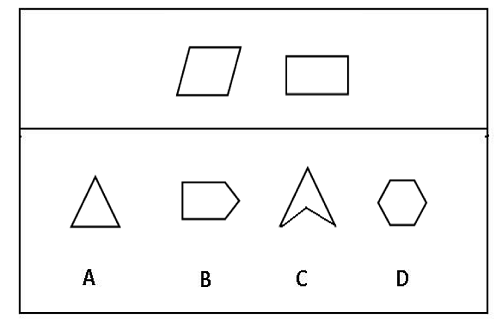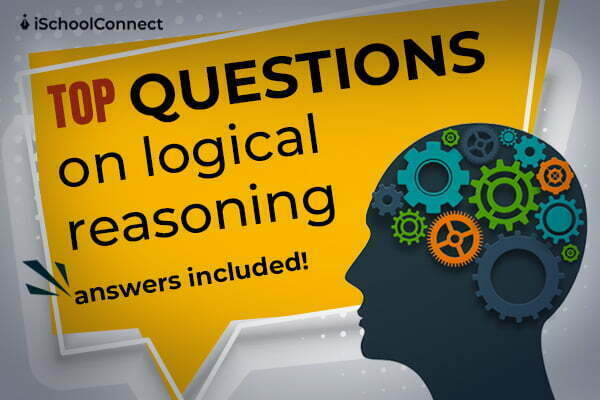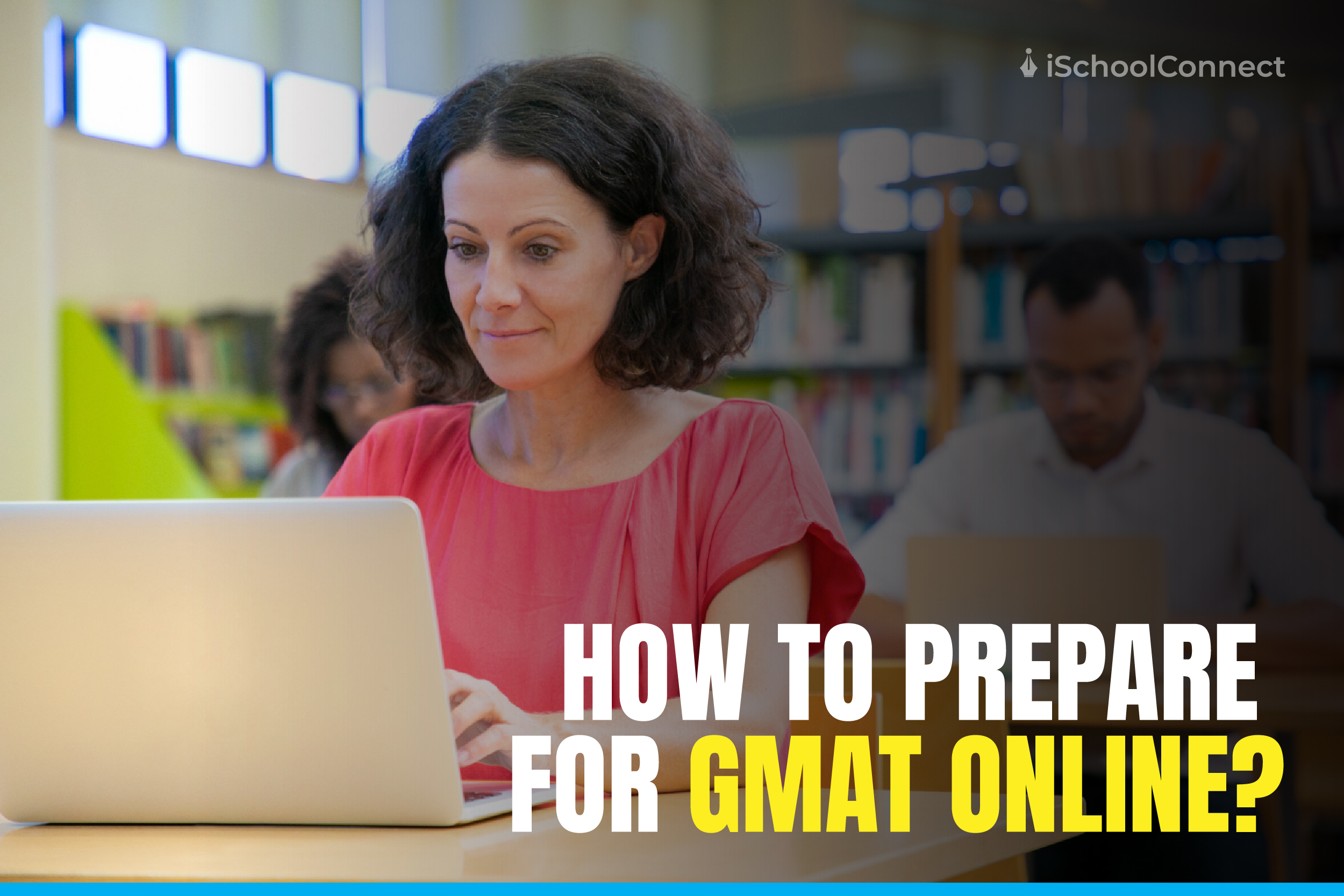Table of Contents
Tricky logical reasoning questions and answers
Every year, millions of aspirants appear for competitive exams like GRE, GMAT, SAT, and more. Each of these tests is designed to measure your aptitude skills and check if you’re ready to take the next step in your career. Logical reasoning questions are a great way to do that.
These questions assess the analytical side of your brain by testing your logical, analytical, reasoning, and decision-making skills. In order to ace them, you need to find the right answer by analyzing data and reaching logical conclusions.
But that doesn’t mean logical reasoning questions are purely mathematical. In fact, logical reasoning is an umbrella term that comprises of lots of different subjects! Let’s take a look at 7 of the most prominent subjects, along with their sample questions and answers below-
1. Logical reasoning
As the name suggests, these questions test your logical skills. They require you to come up with a solution for seemingly complicated problems.
Hard Logical reasoning questions usually pop up in the form of number series, problem statements letter series, analogies, matching definitions, and symbols. Certain insightful tips and tricks can help you crack these questions efficiently.
Question – What number comes next? 5, 7, 6, 8, 7, 9…
- 8
- 7
- 11
- 10
Answer – (1) (first add 2, then subtract 1)
2. Verbal reasoning

These questions usually raise an alarm for those who are most worried about their vocabulary and linguistic knowledge. Verbal reasoning questions include the data that is being provided as a chart, paragraph, table, or code.
These questions may include topics such as sentence completion, matching the right answers, reading comprehension, filling in the blank, etc.
Question: Mr. Brown thought it’d be rather easy to _________ slip out of the room than face his mother’s wrath.
- Courageously
- Blatantly
- Conspicuously
- Sadly
Answer: (3)
3. Non-verbal reasoning
Non-verbal reasoning questions comprise of logical facts, numbers, and also alphabets. Here, you will usually see a series of figures arranged in a particular sequence, and you will then have to find the missing figures. Consequently, non-verbal questions be time-consuming for some students as compared to other subjects.
To expand upon it further, non-verbal reasoning questions include mirror and water images, and also classifications like spotting the missing figure in one whole figure, etc. This requires you to find the answer by analyzing the logic in the series.
Question: The two given figures below have some common properties. Which of the answers figure has the same property?

Answer: (C) (4 sides)
4. Analytical reasoning questions
These questions gauge your analytical and cognitive abilities. They do so by presenting elements and situations, the relations to which need to be analyzed.
This pushes you to reason and to look out for assumptions and also evidence before you zero down on the final answer.
These types of questions may also include parts of a complex figure and problems based on percentages.
Question:
1. A lawyer, a manager, a merchant, and a driver, all live in the same building. Their names are Marc, Ryan, Samuel, and Anthony, not necessarily in that order.
i. Marc and the driver are not friends with Peter.
ii. Ryan and the merchant are friends.
iii. Samuel and the lawyer live on the same floor.
iv. The manager is a friend of Anthony and the merchant.
What is the profession of Peter?
A. Lawyer
B. Manager
C. Merchant
D. driver
Answer: C
5. Data interpretation
Data interpretation usually has the major portion of marks in competitive exams. It usually provides a lot of data through bar graphs, pie charts, line graphs, or other tabulations, and ask questions based on the information presented.
To answer these questions, your calculations need to be precise and accurate. Hence, practicing and being proficient with figures and trying to reach the right answers can help you with these reasoning ability questions.
Question: In the schools of a certain city, there are 2,200 pupils. 200 are in the primary grades and 20% of those in the grammar grades. 60% of the pupils are in the high school, and the rest in the night school. How many pupils are there in the night school?
Answer: 800 pupils
6. Data sufficiency
Data sufficiency questions include a paragraph along with the data. They require a bit of mathematical knowledge and expect you to answer the question after you analyze the paragraph.
However, sometimes, the data to answer the question is not provided in the question. This is when you should mark the ‘data inadequate option’ as the correct answer. Most exams ask data sufficiency questions only during the finals.
Question: A dealer paid $30 for a dozen pairs of shoes; he sold them at a gain of $.75 a pair. What would you have to pay for a pair?
Answer: $2.00 cost of one pair of shoes.
7. Puzzles
These types of questions include continuous diagrams or symbols while you are expected to find the odd one. Cracking reasoning puzzle questions can be done promptly with the right implementation of concepts, tricks, and techniques. Hence, practicing on puzzles can be a great way for you to gain more marks.
Opting for some online puzzles can help you get fluent in cracking them. These puzzles may include number puzzles, playing cards, month and date puzzles, box-based puzzles, floor-based puzzles, and clock-related questions.
Question:
If 123 = 12, 134 = 20, 253 = 40, and 261 = 21, then 542 = ?
Answer: 51
Tips to score well in tough logical reasoning questions
Logical reasoning questions might come across as difficult and tricky at first, but promptness and accuracy can help you solve these questions smoothly. Here’s how to do it-
1. Always take a mock test first
Always take mock test papers, online websites, and also other resources that can help you crack such tests with ease. The mock test papers usually have reasoning questions with explanations which will further help you understand the question.
Additionally, online resources like ebooks, podcasts, YouTube videos, and courses can help you perfect your logical skills in no time. A combination of these before your test can refine your skills and improve your chances of scoring higher.
2. Practice practice practice!
We’re sure you have heard this many times before, but let’s just say it again for good luck- practice makes perfect! The need for constant practice should not be underestimated.
Since practicing realistic sample tests helps to build confidence, sharpens your skills, and helps you calm down before the actual test, it’s good to try it.
Practice your on mock test like it’s a real one and hone your skills. This will help you analyze your answers, review them, and rectify your approach promptly.
3. Make inferences from your observations
Using observational skills means using your senses. Such as hearing, seeing, smelling, and touching to collect information. Using inferences means drawing conclusions from your observations.
Observations are factual because you can see, touch, smell, and feel them. Inferences are more opinionated. When presented with a logical reasoning question use your senses to put yourself in the question and understand it. Then use your deduction skills to find your answer.
4. Develop your soft skills
Develop strategies to solve the logical reasoning aptitude questions. Learning time management is also a crucial aspect of finishing your paper on time. Ensure that you are not spending too much time on any one question. Move on to the question you know best how to solve and come back to the tricky one in case you are left with more time.
Furthermore, skills like focusing on the solution, simplifying things following the solution, and practicing consistently may also help.
Soft skills may not seem crucial when it comes to solving questions. But to work your way around a problem, manage time, not panic, etc. you will need to develop your soft skills.
Key takeaways
- For logical reasoning questions, you need to read in between the lines of the data that’s given.
- Break a question down and try to solve the logic.
- Always take mock test; practice as much as you can.
- Use other sources like podcasts and YouTube videos to get different perspectives.
- Develop your soft skills to work around different problems.
If you’re a bit confused and need any questions answered, you can Contact us. Or you can also comment below!
Did you like this article? Read: 5 benefits of solving previous year question papers
FAQs
Q1. How can you improve your speed with reasoning ability questions?
Answer – You can improve your speed by information management and flexible thinking. Additionally, you can take more tests to see how much time you take, and which questions you need to improve on.
Q2. How do you ace the logical reasoning test?
Answer – The best ways to ace the logical reasoning test include starting with the easiest pattern. Understand what are your strengths and get those questions out of the way. Also, set a limit for how much time you want to spend on one question. Don’t exceed that.
Q3. What are the necessary soft skills required to pass a logical reasoning test?
Answer – The necessary soft skills to pass the test include time management, analytical, and organizational skills.






